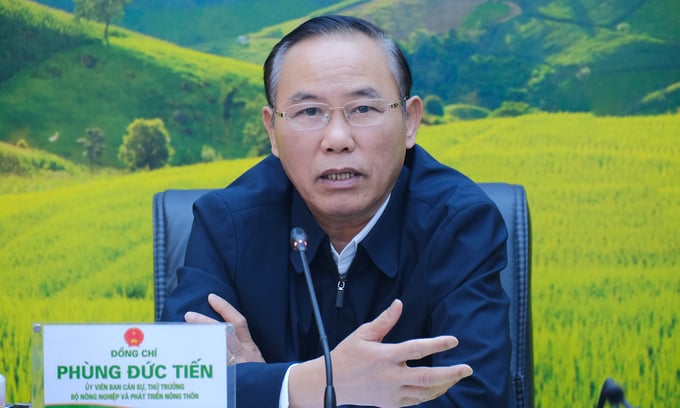June 15, 2025 | 23:44 GMT +7
June 15, 2025 | 23:44 GMT +7
Hotline: 0913.378.918
June 15, 2025 | 23:44 GMT +7
Hotline: 0913.378.918

Mr. Phung Duc Tien, Deputy Minister of Agriculture and Rural Development at the meeting on January 31.
At a recent meeting on January 31 with the Department of Animal Health, AVAC Vietnam JSC and C.P Vietnam Corporation, Deputy Minister of Agriculture and Rural Development Phung Duc Tien directed the units to urgently complete the final stages to announce one more African swine fever (ASF) vaccine, produced by AVAC Vietnam, in February 2023.
After nearly 4 months of conducting narrow-scope tests, the vaccinated pigs still meet immunity criteria and no incidents occur. This can serve as the basis for the vaccine’s announcement and at the same time the sector’s aim to vaccinate livestock on a large scale in the near future.
Regarding the preparations, Deputy Minister Phung Duc Tien directed the Department of Animal Health to coordinate with the production unit to closely monitor four groups of problems: ASF virus’s variants; seed source for vaccine production; culture medium for the vaccine virus on DMAC cells (developed by AVAC); vaccine production processes, lines and equipment. These are factors to consider in order to create a stable, immune-responsive and sterile vaccine.
Previously, AVAC has produced 10 batches of vaccines and 4 of them passed the test results of the Veterinary Medicine Control Center 1. With the consent of the Ministry of Agriculture and Rural Development and the Department of Animal Health, AVAC Vietnam coordinated with units to apply injections in two ways: 1,819 doses for 13 livestock farms in Hoa Binh, Bac Giang, Hanoi, Dong Thap, An Giang, and 600,544 doses for 545 internal farms of C.P Vietnam. Approximately 94% of pigs whose blood samples were taken 28 days after vaccination had antibodies.
According to information from C.P Vietnam - the unit using AVAC's ASF vaccine, before applying vaccination on a larger scale, the company evaluated the effectiveness of the vaccine in some outsourcing establishments (approximately more than 600 heads). As a result, no vaccine virus was detected in the fecal and saliva samples of pigs 14 days after vaccination. The ability of the pigs to respond to immunity until the time of sale (more than 3 months after injection) was still at a safe level. This confirms the vaccine’s effectiveness on health-guaranteed pig farms.

Pigs vaccinated with the AVAC ASF LIVE responded well to immunity.
Thanks to the DMAC cell line technology developed by AVAC Vietnam, the production cost of AVAC ASF LIVE is forecasted to be cheaper. The vaccine is to be produced on a large scale (several million doses per month).
In addition to using vaccines for large livestock systems like C.P Vietnam, Deputy Minister Phung Duc Tien suggested AVAC have policies to strengthen testing small farms across the country. "People's awareness of biosecurity has been raised one step higher. What we need is that all vaccinated pigs respond to immunity until the time of slaughter. It is a crucial matter when it comes to deploying injections on a large scale".
Congratulations on the initial success of AVAC Vietnam, Mr. Nguyen Van Long, Director of the Department of Animal Health, committed to coordinating with the company as well as related units so that the survey process would be as practical as possible. Mr. Long noted that AVAC Vietnam’s current products still held certain risks as only 4 out of 10 vaccine batches have been tested from June to November 2022. Department of Animal Health will continue to test and monitor the quality and usage of AVAC ASF LIVE.
In the meantime, expected to March 2023, the Department of Animal Health requests AVAC Vietnam to have more reports on product stability. Pooled samples are also accepted when the company uses test kits to reduce costs and increase sampling frequency.
The AVAC ASF LIVE vaccine produced by AVAC Vietnam JSC is a lyophilized attenuated vaccine. The vaccine virus was attenuated by means of excision of the virulent gene and cultured on the DMAC cell line medium. This vaccine is recommended for use in broiler pigs 4 weeks of age and older, and not for breeding pigs (gilts, sows and boars). From day 14, vaccinated pigs will show antibodies. The protection period lasts approximately 4 months.
Translated by Samuel Pham
![Turning wind and rain into action: [4] Bringing climate bulletins to remote and isolated areas](https://t.ex-cdn.com/nongnghiepmoitruong.vn/608w/files/linhnhp/2025/06/14/1152-z6704423696987_15fd32ffc26d590d204d520c9dac6786-nongnghiep-151141.jpg)
(VAN) The Vietnam Agriculture and Nature Newspaper interviewed Mr. Vu Thai Truong, Acting Head of Climate Change and Environment at UNDP Vietnam, to gain deeper insight into how climate bulletins are delivered to farmers.

(VAN) In Tien Giang, a high-tech shrimp farm has developed a distinctive energy-saving farming model that has yielded promising results.
![Turning wind and rain into action: [3] 300.000 farmers benefit from agro-climatic bulletins](https://t.ex-cdn.com/nongnghiepmoitruong.vn/608w/files/news/2025/06/12/e5a48259d6a262fc3bb3-nongnghiep-125122.jpg)
(VAN) The agro-climatic bulletin has become a valuable tool for farmers in the Mekong Delta. After more than five years of implementation, the initiative is gradually being expanded nationwide.
![Turning wind and rain into action: [2] Providing forecasts to the people](https://t.ex-cdn.com/nongnghiepmoitruong.vn/608w/files/news/2025/06/12/e5a48259d6a262fc3bb3-nongnghiep-103927.jpg)
(VAN) In addition to improving the quality of hydrometeorological forecasts, putting forecast bulletins into practical use is crucial for production and disaster prevention.

(VAN) Blue carbon is receiving attention for its rapid absorption capacity and vast potential. It represents a promising nature-based solution to respond to climate change.
/2025/06/11/3507-1-161904_583.jpg)
(VAN) Seagrass beds and coral reefs serve as 'cradles' that nurture life in the ocean depths, creating rich aquatic resources in Vietnamese waters.
![Turning wind and rain into action: [1] Forecasting for farmers](https://t.ex-cdn.com/nongnghiepmoitruong.vn/608w/files/news/2025/06/11/e5a48259d6a262fc3bb3-nongnghiep-111919.jpg)
(VAN) Weather is no longer just a matter of fate. Forecasts have now become an essential companion for farmers in every crop season.